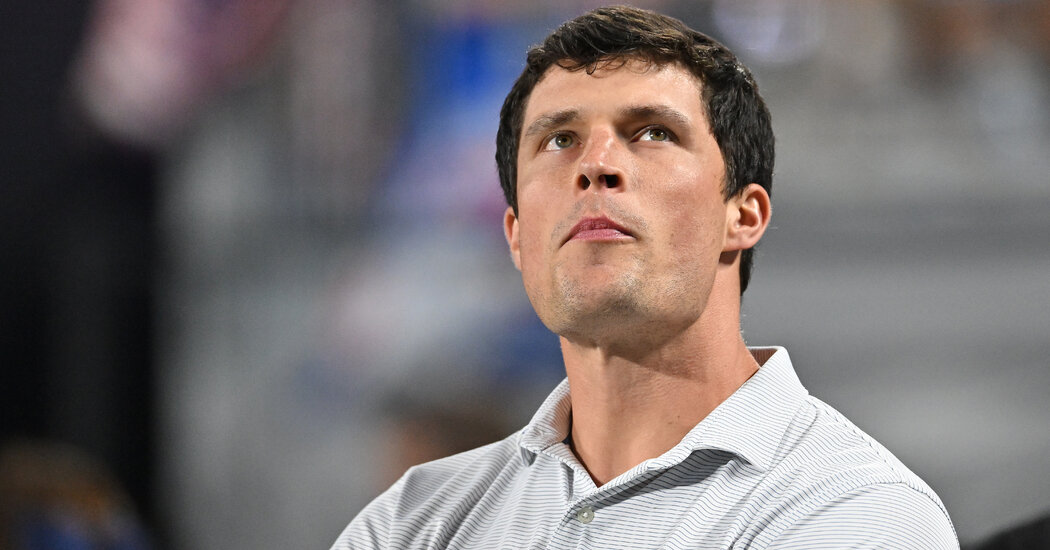When Luke Kuechly at 28, he played eight stellar years as a linebacker for the Carolina Panthers and had at least three documented concussions.
He joins other star players under the age of 30, including quarterback Andrew Luck and tight end Rob Gronkowski, who have chosen to leave pro football largely because of concerns about the long-term implications of health in play. (Gronkowksi returned after a season.)
But Kuechly, 32, remains closely tied to the game, having worked for a time as a scout for his former team and now coaches 12-year-olds with his former teammate. Greg Olsen.
In a phone interview from his home in Charlotte, NC, Kuechly discussed watching current NFL players like Tua Tagovailoa take hits to the head, whether he’s concerned about his mental health, and what he told his players’ parents about the dangers of tackling football.
This interview has been slightly edited for clarity and condensed.
You visited Congress last month to discuss traumatic brain injury. What do you think the level of awareness is?
I think everyone understands the situation around TBI and concussion. I think everyone understands that there are things that can be done. But the more we can get up there and talk about it and explain perspectives and different ways of looking at it and small ways to help have a positive impact, I think that we are better.
You joined the NFL in 2012, when awareness of concussions was changing dramatically. Do you notice that difference?
I think everyone in the NFL has a different microscope on it, actually, a lot of times in a positive way. There is a very strict return to play policy, No. . So the NFL, I think, has done a very good job of trying to keep the players safe on the field and give them a chance to be safe when they come back to play as well.
You have many disorders. Is there one of them that is more difficult to deal with than the others?
You watch other guys, you learn from other guys, you talk to a lot of guys — and that’s what you hear, is: “Hey, let yourself get better. When you’re good, you can go back there.” That’s what I learned, fortunately early on, from our trainers and our coaches and different doctors and guys that I played with that said it’s not like a sprained ankle where it can you just have to face it and bear it and it’s hard. . This is something where you have to be smart and understand that this is a different situation. You need to let it go better.
Do you think the culture of walking away from the game at a relatively young age has changed during your time in the NFL?
If you remember this, Barry Sanders left a few years early. Calvin Johnson clearly walked away. Gronk walked away. I think it just happens at a different point for everyone. [Sanders and Johnson both retired at 30. Gronkowski announced his first retirement at 29.]
You are working as a scout for the Panthers in 2020. Why?
I love football, I love being around the game, I love being with the boys. And that was a really good opportunity for me to slowly, over the course of the year, move away from the team, but still be able to get around it and get around the game, be involved and have a little bit of an impact. And obviously there’s a little bit of structure involved with that just because we’re out there almost every day working on different projects, checking waiver wires, looking at free agents.
I thought you were looking at what happened to Tua Tagovailoa last year. Are you a little stunned?
No. The biggest thing for me is that I want the boys to be safe. I want boys to have the opportunity to play as much as possible in the sport they love. But I think everybody in the NFL understands that it’s a cruel game. It’s physical, it’s hard. There are big strong men running around, and getting sick is inevitable. I want Tua to play as much as Tua wants to play, and I want him to play as safe as he can. But in the end it’s kind of a sport now: Just big guys running fast, hitting hard, lifting weights. Things happen very quickly there.
A study was published last week which looks not only at the number of hits players have taken over the course of their careers, but also at their cumulative impact. Are you concerned about your own long-term mental health?
I’m not worried about it, but I know it. Since I finished the game, I read a lot. I have a lot of homework. I talked a lot. I wasn’t worried about it, but I knew it was like, “Hey, there are some things that you can do that can be useful and might as well make the most of it.”
I think the biggest thing for me is living a healthy life. Eat well, sleep well, exercise, go outside, have good relationships with people. Keep your mind active.
If you were coaching, what would you say to parents who are concerned about sports safety?
I tell people a lot: “Hey, you did what you thought was best for your child. You are their parent. Ultimately you know what is best for them. †I only talk about the positives, if this is what I learned about resilience, how to fight things, how to build relationships, the people I met in the game, the experiences I had in the game.
